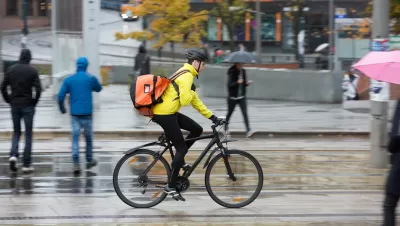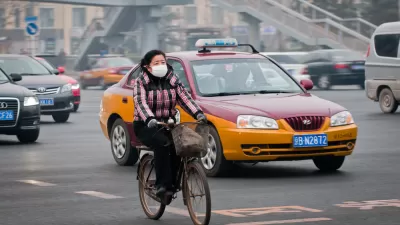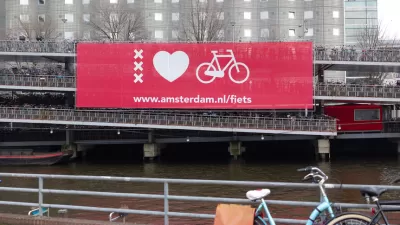Self-driving car companies have proposed equipping bikes, pedestrians, and even pets with the ability to communicate their positions wirelessly. But should autonomous cars really need the help?

"The most difficult detection problem that autonomous vehicle systems face"—according to a 2017 report from the Institute of Electrical and Electronic Engineers—is bicycles.
That's a blind spot with life-or-death stakes, so companies like Ford, Tome Software, and Trek Bicycle have proposed a possible solution: give bikes the ability to simply tell autonomous cars where they're going. But Christina Bonnington argues in Slate that bicycle-to-vehicle communication—or its logical extension, vehicle-to-everything—is just a crutch for fundamentally inadequate detection technology.
After comparing the logistics of distributed communication to the high-performing detection systems boasted by some AV companies, like Uber and Waymo, Bonnington concludes:
"Bicycle-to-vehicle communication is a good idea and could be useful in certain scenarios, such as when visibility is low—at night or in the rain—or on tricky, twisty back roads with blind corners. But if cars are going to drive the roads without human help, they need to be able to handle all of the challenges that come with it, regardless of whether they’re wirelessly connected to the world around them."
FULL STORY: The Cyclist Problem

Alabama: Trump Terminates Settlements for Black Communities Harmed By Raw Sewage
Trump deemed the landmark civil rights agreement “illegal DEI and environmental justice policy.”

Study: Maui’s Plan to Convert Vacation Rentals to Long-Term Housing Could Cause Nearly $1 Billion Economic Loss
The plan would reduce visitor accommodation by 25% resulting in 1,900 jobs lost.

Planetizen Federal Action Tracker
A weekly monitor of how Trump’s orders and actions are impacting planners and planning in America.

Waymo Gets Permission to Map SF’s Market Street
If allowed to operate on the traffic-restricted street, Waymo’s autonomous taxis would have a leg up over ride-hailing competitors — and counter the city’s efforts to grow bike and pedestrian on the thoroughfare.

Parklet Symposium Highlights the Success of Shared Spaces
Parklets got a boost during the Covid-19 pandemic, when the concept was translated to outdoor dining programs that offered restaurants a lifeline during the shutdown.

Federal Homelessness Agency Places Entire Staff on Leave
The U.S. Interagency Council on Homelessness is the only federal agency dedicated to preventing and ending homelessness.
Urban Design for Planners 1: Software Tools
This six-course series explores essential urban design concepts using open source software and equips planners with the tools they need to participate fully in the urban design process.
Planning for Universal Design
Learn the tools for implementing Universal Design in planning regulations.
Caltrans
Smith Gee Studio
Institute for Housing and Urban Development Studies (IHS)
City of Grandview
Harvard GSD Executive Education
Toledo-Lucas County Plan Commissions
Salt Lake City
NYU Wagner Graduate School of Public Service




























